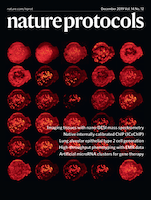
Nature Protocols
metrics 2024
Elevating Experimental Excellence
Introduction
Nature Protocols, published by NATURE PORTFOLIO, is a premier academic journal specializing in the dissemination of innovative and practical experimental methodologies in the vast field of biochemistry, genetics, and molecular biology. With an impressive Scopus rank of #5 out of 221 journals and a 97th percentile status, it stands firmly in the Q1 quartile, reflecting its integral role in advancing scientific knowledge. Established in 2006, this journal provides an invaluable resource for researchers and practitioners aiming to refine their experimental techniques, ultimately driving forward the frontiers of life sciences. While currently operating under a subscription model, the journal continues to be a pivotal platform for sharing high-quality, peer-reviewed protocols that facilitate reproducibility and transparency in research. Addressing a global audience from its base in the United Kingdom, Nature Protocols is dedicated to fostering collaboration and innovation, making it indispensable for professionals and students engaged in cutting-edge scientific endeavors.
Metrics 2024
 7.42
7.42 13.10
13.10 17.40
17.40 303
303Metrics History
Rank 2024
Scopus
IF (Web Of Science)
JCI (Web Of Science)
Quartile History
Similar Journals

BULLETIN OF EXPERIMENTAL BIOLOGY AND MEDICINE
Connecting Researchers to Transformative Discoveries in ScienceBULLETIN OF EXPERIMENTAL BIOLOGY AND MEDICINE is a prestigious journal published by SPRINGER, dedicated to advancing knowledge in the fields of biochemistry, genetics, molecular biology, and medicine. Established in 1956 and continuing to be relevant through to 2024, this journal provides a vital platform for researchers to publish original findings and significant reviews that contribute to these essential disciplines. With an ISSN of 0007-4888 and an E-ISSN of 1573-8221, it enjoys a respectable standing in the academic community, currently positioned in the Q3 quartile of both Biochemistry, Genetics and Molecular Biology, and Medicine categories for 2023. Despite its traditional subscription model, the journal reaches a wide audience of professionals, students, and researchers, who benefit from timely access to impactful research and experimental studies. By fostering a rich dialogue in experimental biology and medicine, this journal plays an important role in shaping ongoing research and understanding of complex biological systems.

Methods and Protocols
Sharing knowledge, inspiring progress in the life sciences.Methods and Protocols is a prestigious open-access journal published by MDPI, focusing on the critical domain of biochemistry, genetics, molecular biology, and biotechnology. Launched in 2018 and based in Basel, Switzerland, the journal provides a vital platform for sharing innovative methodologies and experimental protocols that advance scientific research and development. With an impressive Q2 ranking in multiple categories, including Biochemistry, Genetics and Molecular Biology, and Biotechnology, it fosters a collaborative environment for researchers and professionals to disseminate their findings. With a mission to enhance reproducibility and transparency in scientific inquiry, Methods and Protocols not only serves as an essential resource for academia but also contributes to the practical application of research in various industries. The journal's open-access model ensures that cutting-edge research is accessible to a global audience, thus promoting knowledge sharing and inspiring future innovations within the scientific community.

BRITISH JOURNAL OF BIOMEDICAL SCIENCE
Elevating Standards in Biomedical Research and PracticeBRITISH JOURNAL OF BIOMEDICAL SCIENCE is a distinguished peer-reviewed journal dedicated to publishing high-quality research in the field of biomedical science. Published by FRONTIERS MEDIA SA, this journal aims to advance knowledge in essential disciplines such as biochemistry, immunology, microbiology, and infectious diseases. Since its inception in 1993, the journal has maintained a solid reputation, achieving notable rankings across multiple Scopus categories, including Q2 in Biochemistry (medical) and Q3 in Clinical Biochemistry and Infectious Diseases. With an emphasis on open access, it facilitates the widespread dissemination of scientific knowledge, ensuring that researchers, professionals, and students can access cutting-edge studies and findings essential for driving innovation in medical and clinical practices. The journal's rigorous editorial standards and commitment to scientific excellence make it an invaluable resource for anyone looking to stay at the forefront of research in biomedical sciences.

Advances in Clinical and Experimental Medicine
Connecting Scholars for a Healthier TomorrowWelcome to Advances in Clinical and Experimental Medicine, an esteemed publication by WROCLAW MEDICAL UNIVERSITY, dedicated to advancing the essential fields of clinical and experimental medicine. With an open access model since 2017, this journal ensures that researchers, healthcare professionals, and students worldwide can freely access high-quality scientific content. Covering a broad spectrum of topics including biochemistry, genetics, internal medicine, and pharmacology, Advances in Clinical and Experimental Medicine has established itself as a pivotal resource in the scientific community, currently holding prestigious rankings such as Q2 in Biochemistry, Genetics, and Molecular Biology (miscellaneous) and Q1 in Reviews and References (medical) for 2023. Spanning over two decades of rigorous research publication, the journal is a critical platform for sharing innovative findings and fostering collaboration among scholars, making it an invaluable asset for those at the forefront of medical science.

Scientific Reports
Unleashing Innovation Through Open Access Research.Scientific Reports, published by the esteemed NATURE PORTFOLIO, is a prominent multidisciplinary journal that has been making significant strides in scientific communication since its inception in 2011. With an impressive impact factor and ranked in the Q1 category of multidisciplinary journals, it holds a respected position, placing it at #14 out of 171 according to Scopus rankings, reflecting its high citation rates and robust academic contributions in the 92nd percentile. The journal operates under an Open Access model, enabling broad dissemination of research findings and advancing scientific knowledge globally. Based in the United Kingdom, with offices in Germany, Scientific Reports is committed to publishing high-quality, peer-reviewed research across diverse fields, catering to the needs of researchers, professionals, and students alike, fostering collaboration and innovation in the scientific community.

INDIAN JOURNAL OF EXPERIMENTAL BIOLOGY
Connecting Ideas, Inspiring Solutions in BiologyINDIAN JOURNAL OF EXPERIMENTAL BIOLOGY, published by the NATL INST SCIENCE COMMUNICATION-NISCAIR, stands as a significant platform for the dissemination of original research in the fields of biochemistry, genetics, and molecular biology, particularly within the context of Indian scientific advancements. With its ISSN 0019-5189 and E-ISSN 0975-1009, the journal has been an essential resource since its inception in 1965, although coverage in prominent databases like Scopus was discontinued in 2018. The journal ranks in the 57th percentile for Biotechnology, as well as in the 27th and 25th percentiles for Molecular Biology and Cell Biology respectively, underscoring its impact and relevance. While currently not an Open Access journal, it continues to provide valuable insights and contributions from researchers and professionals in the growing field of experimental biology. The esteemed contributions published in this journal enhance our understanding of biological processes and foster the development of innovative solutions to contemporary challenges in health and environmental science.

PLOS BIOLOGY
Transforming Biological Research into Global KnowledgePLOS BIOLOGY, published by PUBLIC LIBRARY SCIENCE, is a leading open-access journal that has been at the forefront of biological research since its inception in 2003. This high-impact journal (with an impressive Scopus ranking placing it in the top 10% across multiple biological disciplines) aims to disseminate groundbreaking research findings in a variety of fields, including Biochemistry, Genetics, Molecular Biology, Immunology, Microbiology, and Neuroscience. With a commitment to open-access principles, PLOS BIOLOGY ensures that its content is freely available to a global audience, fostering collaboration and innovation among researchers, professionals, and students worldwide. Its Q1 quartile status in 2023 highlights the journal's prestigious standing within the academic community, making it an essential resource for those seeking to stay updated with the latest advancements in biological sciences. The journal's scope extends from 2003 to 2024, reflecting its sustained relevance and impact in driving forward biological discoveries.

Journal of Biological Research-Bollettino della Societa Italiana di Biologia Sperimentale
Unlocking the Secrets of Genetics and Molecular BiologyThe Journal of Biological Research-Bollettino della Societa Italiana di Biologia Sperimentale is a premier peer-reviewed journal published by PAGEPRESS PUBL, focusing on a diverse array of topics within the broad field of biological research. Established as an Open Access journal since 2009, it facilitates the dissemination of scientific knowledge across the globe, enhancing visibility and accessibility for researchers, professionals, and students alike. With an ISSN of 1826-8838 and E-ISSN 2284-0230, this journal serves as a platform for innovative studies in Biochemistry, Genetics, and Molecular Biology, with a growing emphasis on Plant Science. Although currently categorized in the Q4 quartile for various sub-disciplines, the journal is dedicated to fostering interdisciplinary collaboration and advancing research quality. The latest Scopus rankings indicate a burgeoning presence in the academic community, positioning itself at significant ranks within the fields it covers. With publication coverage extending from 2011 to 2024, the journal aims to push the frontiers of biological research while adapting to the evolving demands of the scientific community.

Nature Reviews Methods Primers
Bridging the gap between science and application.Nature Reviews Methods Primers, published by SpringerNature, stands as a pivotal resource in the fields of biochemistry, genetics, molecular biology, and medicine, boasting an impressive impact factor indicative of its scholarly influence. This open-access journal, launched in 2021, aims to disseminate comprehensive, accessible overviews of innovative methodologies that can transform scientific research and clinical practices. With a remarkable Scopus rank of #7 out of 636 in General Medicine and a stellar #3 out of 221 in General Biochemistry, Genetics and Molecular Biology, it resides in the esteemed Q1 Quartile category for its contributions to academia. Researchers, professionals, and students will find Nature Reviews Methods Primers to be an invaluable tool as it bridges the gap between methodology and practical application, enabling advancement in a variety of biomedical fields.

MethodsX
Advancing methodologies for a brighter scientific future.MethodsX is a premier peer-reviewed journal published by Elsevier, dedicated to advancing the field of applied methods across various disciplines, particularly in Clinical Biochemistry and Medical Laboratory Technology. Since its inception in 2014, this Open Access journal has fostered innovation by allowing researchers to share and access high-quality methodologies designed to enhance reproducibility and effectiveness in research practices. Based in the Netherlands, MethodsX has achieved an impressive ranking in the Scopus database, placing in the top 78th percentile among multidisciplinary journals. The journal is committed to providing researchers, professionals, and students with a platform to disseminate new techniques and strategies, ensuring that groundbreaking methods are readily available to the global scientific community. With a focus on fostering collaboration and interdisciplinary research, MethodsX aims to bridge gaps across various scientific domains and empower future advancements until its converged years in 2024.